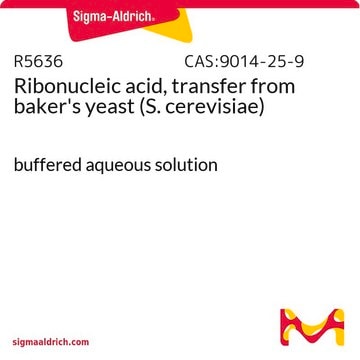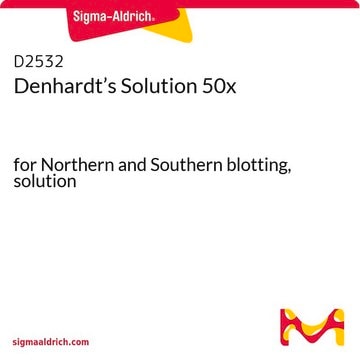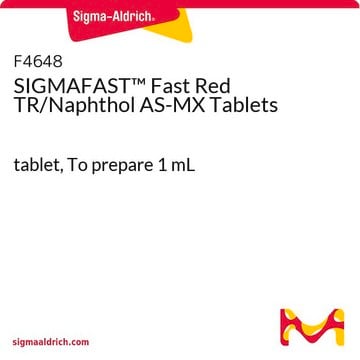R3629
Ribonucleic acid diethylaminoethanol salt
Type IX
Synonym(s):
Ribonucleic acid from torula yeast, RNA
Sign Into View Organizational & Contract Pricing
All Photos(2)
About This Item
Recommended Products
type
Type IX
storage temp.
2-8°C
Looking for similar products? Visit Product Comparison Guide
Application
Ribonucleic acid (RNA) from torula yeast may be used as a substrate for studying ribonuclease activities of enzymes such as ribonuclease-A, ribonuclease T1 (RNAase) and bougainvillea xbuttiana antiviral protein 1 (BBAP1).
Storage Class Code
11 - Combustible Solids
WGK
WGK 3
Flash Point(F)
Not applicable
Flash Point(C)
Not applicable
Personal Protective Equipment
dust mask type N95 (US), Eyeshields, Gloves
Certificates of Analysis (COA)
Search for Certificates of Analysis (COA) by entering the products Lot/Batch Number. Lot and Batch Numbers can be found on a product’s label following the words ‘Lot’ or ‘Batch’.
Already Own This Product?
Find documentation for the products that you have recently purchased in the Document Library.
Customers Also Viewed
Giulia Biffi et al.
Nature chemistry, 6(1), 75-80 (2013-12-19)
Following extensive evidence for the formation of four-stranded DNA G-quadruplex structures in vitro, DNA G-quadruplexes have been observed within human cells. Although chemically distinct, RNA can also fold in vitro into G-quadruplex structures that are highly stable because of the
Lisa Hui et al.
Obstetrics and gynecology, 121(6), 1248-1254 (2013-07-03)
To identify the tissue expression patterns and biological pathways enriched in term amniotic fluid cell-free fetal RNA by comparing functional genomic analyses of term and second-trimester amniotic fluid supernatants. This was a prospective whole genome microarray study comparing eight amniotic
Guo-Liang Chew et al.
Development (Cambridge, England), 140(13), 2828-2834 (2013-05-24)
Large-scale genomics and computational approaches have identified thousands of putative long non-coding RNAs (lncRNAs). It has been controversial, however, as to what fraction of these RNAs is truly non-coding. Here, we combine ribosome profiling with a machine-learning approach to validate
Hilal Kazan et al.
Nucleic acids research, 41(Web Server issue), W180-W186 (2013-06-12)
RBPmotif web server (http://www.rnamotif.org) implements tools to identify binding preferences of RNA-binding proteins (RBPs). Given a set of sequences that are known to be bound and unbound by the RBP of interest, RBPmotif provides two types of analysis: (i) de
Yue Wan et al.
Nature, 505(7485), 706-709 (2014-01-31)
In parallel to the genetic code for protein synthesis, a second layer of information is embedded in all RNA transcripts in the form of RNA structure. RNA structure influences practically every step in the gene expression program. However, the nature
Our team of scientists has experience in all areas of research including Life Science, Material Science, Chemical Synthesis, Chromatography, Analytical and many others.
Contact Technical Service











